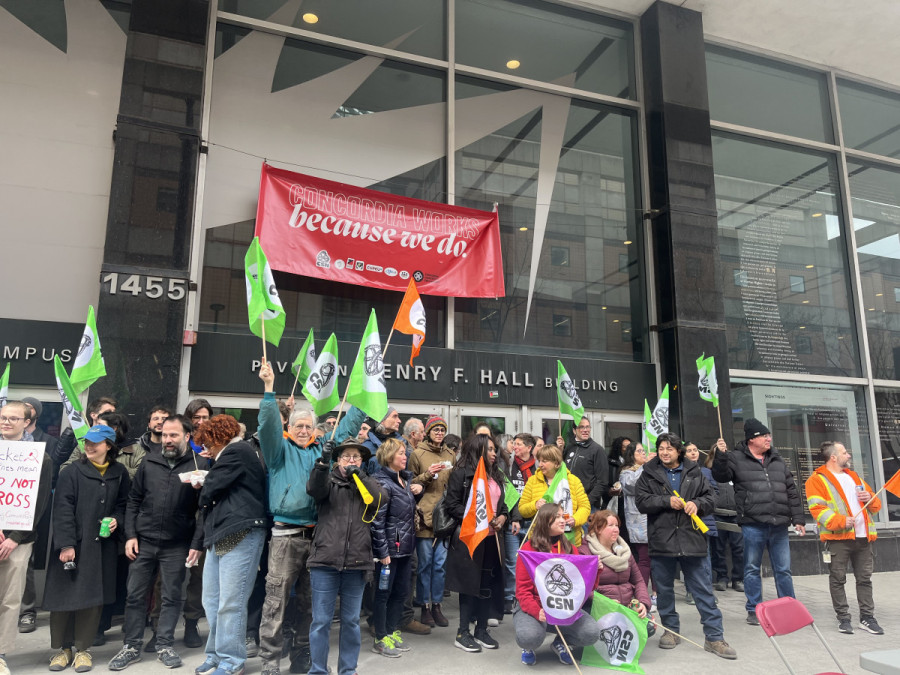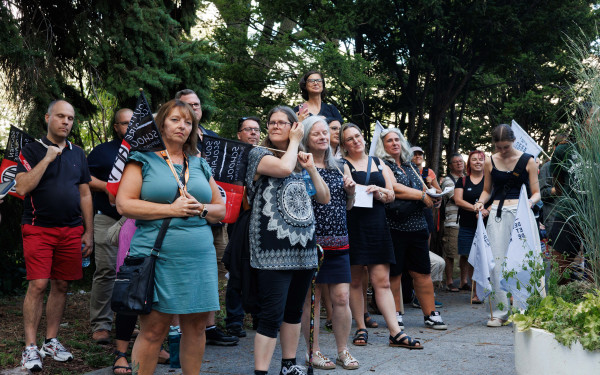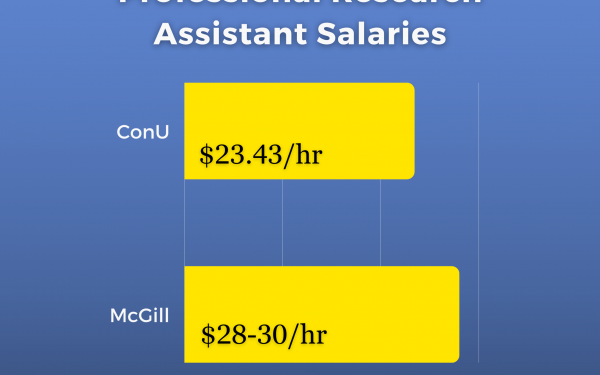Concordia’s CSN unions continue demanding fair pay
Concordia’s unions are still fighting to have their collective agreements renewed
On March 28, members from Concordia’s Confédération des syndicats nationaux (CSN)-affiliated unions demonstrated outside the Hall building to advocate for the resolution of ongoing contract negotiations.
The demonstration brought together community supporters and members from all six CSN-affiliated unions, which represent a wide range of staff: technicians, library clerks, electricians, TAs, accountants, nurses, etc.
For over six months now, CSN-affiliated unions at Concordia have been unable to reach a consensus with the administration about updated demands to their collective agreements. Specific demands vary between unions, but overwhelmingly, members are advocating for higher wages, increased staff and greater workplace safety.
According to union members, the rising cost of living has made these negotiations increasingly urgent. Without a renegotiated and renewed collective agreement, members of these unions have explained that they would be locked into wages, benefits, and agreements decided in their most recent collective agreements, which were signed in 2021.
According to the Bank of Canada inflation has increased by 14.3 per cent since then.
“We’re asking for indexation, we want our wages to increase as inflation increases,” said June McIntyre, a rank-and-file member of Concordia University Union of Support Staff—Technical Sector.
“Our conditions as the staff are directly correlated to the quality of education that students receive,” said McIntyre.“With these negotiations, we need to put our foot down a little. It needs to get worse before it’s going to get better.”
Negotiations for an updated Concordia Research and Education Workers (CREW) collective agreement have not begun yet, but the union plans on advocating to overhaul the existing policies on harassment. Colin Crawford, the bargaining officer for CREW, said that workplace safety is an ongoing issue for teaching and research assistants.
For teaching and research assistants, workplace safety issues range widely, including everything from insufficient lab protocols to sexualized abuses of power.
“We want to fight for real policies in our collective agreement which would allow us to refuse unsafe work, to report [incidences of sexual abuse] and file complaints without fear of retaliation,” Crawford said.
Beyond workplace safety, CREW will be negotiating for higher wages as well as fair and transparent hiring practices.
Another area of concern for union members is the lack of incoming staff. As part of their effort to balance the budget, Concordia has implemented a hiring freeze for all new employees, including hiring new people to replace staff that have left a vacant position.
Yalda Hassan Pour, a library clerk and member of the Concordia University Library Employees' Union, noted that this change has forced remaining staff members to compensate for the vacant positions by picking up more work. The impacts of the freezes are being felt across the unions.
“We’re doing overtime constantly,” said Eddy Dorozowsky, a member of Concordia’s trade union (STTMC-SGW), “I did three hours of overtime last night, four guys did an hour and a half [of overtime] in the morning. It’s constantly like that because we’re low staff.”
Although STTMC-SGW staff are compensated for their overtime work, Dorozowsky said that this workload is unsustainable and has led to burnout among staff. On top of standard employee turnover, Dorozowsky said that burnout and non-competitive wages have resulted in many STTMC-SGW staff leaving Concordia for higher-paying trade jobs.
“We’ve lost a lot of employees, great employees that were working here,” said Dorozowsky, “They found better and who can blame them?”
“We just want equality too,” said Dorozowsky. “When the presidents and the bosses get such an augmentation and it doesn't reflect across the board, we have to say something about it.”







